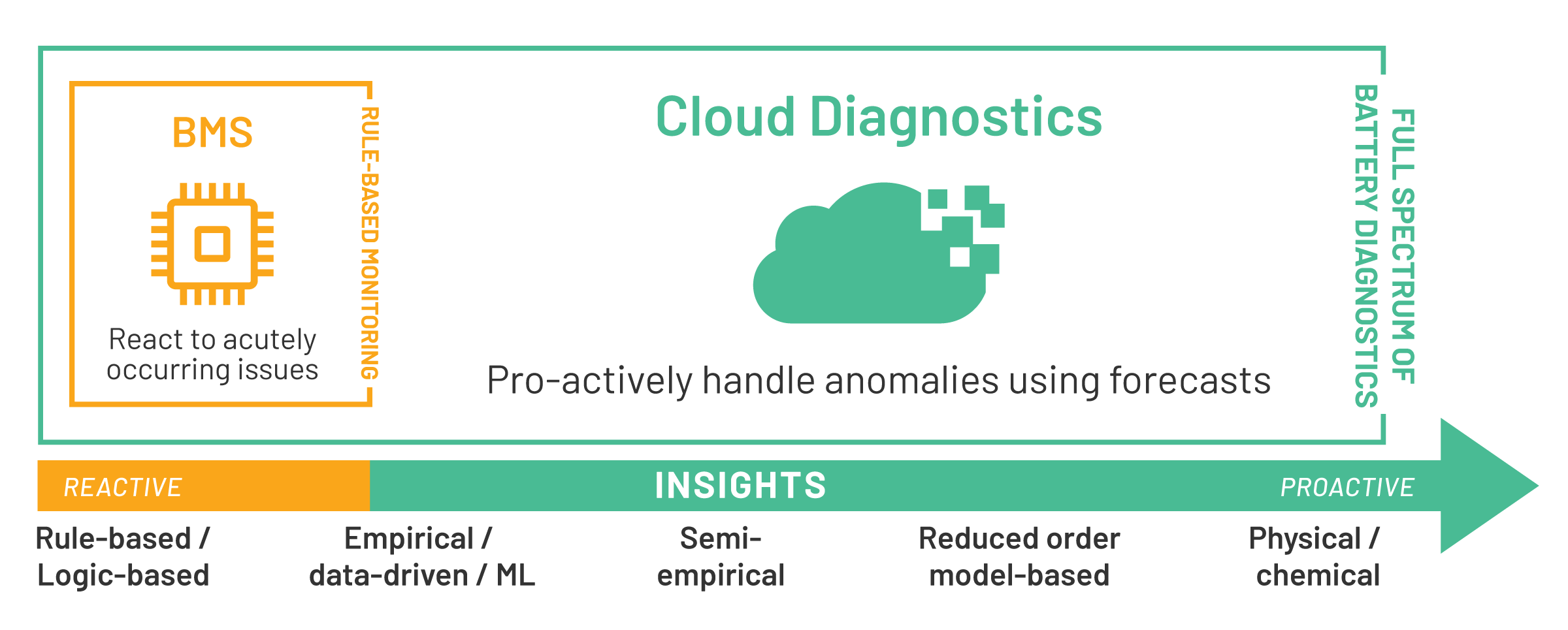Battery Energy Storage Systems (BESS) are playing a pivotal role for renewable energies. These BESS are composed of thousands of battery modules, each containing multiple cells connected in serial and parallel. This makes them extremely complex—requiring vigilant supervision and management. This is where the BMS comes into play—serving as the brains of the battery modules. Despite its vital role, the BMS has limitations. In this article, we'll delve into standard BMS functionalities, explore its limitations, and highlight the symbiotic role of cloud-based analytics.
What is a Battery Management System (BMS)?
Battery management systems (BMS) monitor and manage individual battery cells within a Battery Energy Storage System (BESS). A BESS is comprised of multiple racks, each comprised of several battery modules. Each module is equipped with at least one BMS responsible for overseeing the battery cells in real time.

The primary functions of a battery management system include:
- Monitoring Battery Cells: The BMS continuously monitors the voltage, current, and temperature of battery cells1 to ensure they operate within safe limits. In this way, it safeguards battery cells by preventing faulty battery states such as overvoltage, overtemperature, or deep discharge.
- Cell Balancing: Battery cells within a pack are rarely identical due to production-related variations, even within a quality grade range, in terms of capacity or resistance. Over time, these differences can become more pronounced due to variations in manufacturing, operating conditions, and age. To overcome these differences, the BMS balances the battery packs.
- Fault Detection and Response: The BMS promptly reacts to faults and anomalies, minimizing potential damage and contributing to the safety of the battery system. In emergency situations, the BMS acts as an emergency brake, cutting off power to prevent catastrophic failures.
- State of Charge (SoC) and State of Health (SoH) Estimation: The BMS estimates the current state of charge and health of the battery, providing critical information for system operation and maintenance.
1 Additional measures such as moisture, gas, acceleration, or electrochemical impedance spectroscopy (EIS) are possible.
The main role of a BMS is to react swiftly to immediate issues or anomalies within the battery system. This reactive approach is essential to prevent catastrophic failures, overheating, or other hazardous situations. The BMS relies on robust and fast-reacting algorithms based on rules or logic to detect predefined threshold violations and respond promptly. However, rules and pre-defined thresholds do not take into account the unique operating conditions of the particular storage asset.
Limitations of Battery Management Systems
While the BMS serves as a vital guardian of battery modules, it has certain limitations:
- Short-sighted: Focused on reacting to acute issues, the BMS has limited capacity to learn from other batteries in the system and in the field.
- Limited Access to Historical Data: The BMS typically lacks robust historical data analysis capabilities, hindering trend monitoring and long-term performance analysis.
- Not 100% Fail-Safe: The BMS itself can experience problems. For example, if a BMS doesn’t recognize a sensor error, it can result in a battery fault.
- Lacks ability to foresee incidents: The BMS cannot predict unexpected incidents, such as incorrect current data due to loose plugs.
- Inconsistencies with Aging Model Updates: It may not adapt its algorithms as the battery ages or operates under varying conditions, leading to inaccuracies.
- Inaccurate SoC and SoH Estimation: The accuracy of SoC and SoH estimates is limited, impacting overall system performance.
Benefits of Predictive Battery Analytics in the Cloud
The BMS limitations mentioned can be addressed through cloud-computing analytics. With advanced algorithms, such as battery modeling and machine learning-based techniques, cloud computing can provide insights that go far beyond the onsite BMS. For instance, cloud-based analytics can pinpoint battery anomalies before they escalate into dangerous situations. Or it can identify underperforming cells that are resulting in lost revenue for asset owners.

How Cloud-Based Algorithms Overcome BMS Limitations
- Statistical Anomaly Detection: Cloud analytics can compare data from millions of cells, enabling statistical anomaly detection and trend analysis. This allows for the early identification of deviations from normal behavior, helping prevent potential issues.
- Historical Data Analysis: Cloud-based solutions can investigate historical data, identifying long-term trends and potential problems that may not be apparent to a BMS relying on real-time data alone.
- Reliable Forecasting: Cloud-based platforms leverage advanced forecasting models to predict battery performance more accurately. This enables proactive maintenance and optimization, ensuring the battery system operates efficiently.
- Continuous Monitoring: Cloud analytics provide continuous monitoring of the BMS and sensor functionality. It can detect BMS malfunctions and sensor issues, preventing potentially significant problems.
- Scalable Computational Power: Cloud solutions offer scalable computational power, making them well-suited for BESS installations. This scalability ensures that data from extensive systems can be efficiently processed and analyzed, maintaining system reliability.
Conclusion: BMS and Cloud Battery Analytics Form a Symbiotic Relationship
In the evolving landscape of energy storage, BMS and cloud-based battery data analytics have a symbiotic relationship that ensures the reliability, performance, and longevity of the system. While the BMS serves as the immediate guardian of battery health, cloud analytics offer an additional layer of value and safety.
Together, they collectively enhance safety, facilitate proactive maintenance, and improve the overall performance of energy storage systems. As renewable energy adoption continues to grow, the collaboration between BMS and cloud analytics will play a pivotal role in ensuring the sustainability and reliability of our energy infrastructure.


